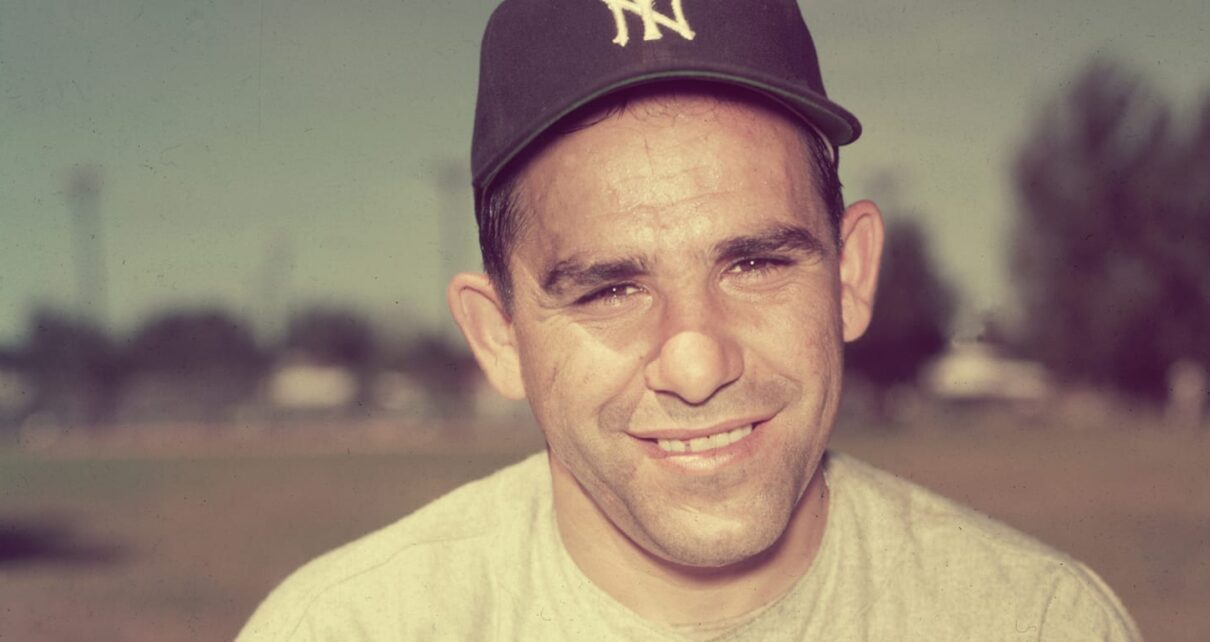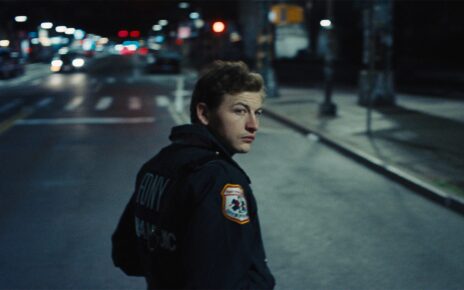Did you know Yogi Berra was at Normandy? Weird, huh? I dunno quite what to do with that. It’s like finding out, say, that Aaron Rodgers was part of the January 6 mob. Let me be clear: the latter DID NOT HAPPEN. Aaron Rodgers did not storm the Capitol illegally at the urging of President Trump … but if he had, would you chalk it up to nifty trivia or “that’s impossible?” Well, Yogi Berra Really did participate in D-Day and I’m chalking it up to nifty trivia.
Lorenzo Pietro Berra (aka “Yogi”) grew up in the 1930s in an Italian section of St. Louis known derogatively at the time as “Dago Hill.” You want to know where “woke” gets you? It gets you to stop naming things ”Dago Hill.” Berra wasn’t pretty or graceful or tall, but he was very obviously the best ballplayer any local had ever seen. Branch Rickey had a coup to make Berra a Brooklyn Dodger by having the St. Louis Cardinals lowball him after an impressive tryout, but the ever-shrewd-ever-opportunistic New York Yankees signed him first.
It should be noted that this entire documentary was inspired by the “lowballing” of Yogi, so-to-speak. At an All-Star Game about ten years ago, four Hall of Famers were trotted out as the greatest living players of Major League Baseball. Yogi’s people took exception. They weren’t necessarily wrong; they weren’t necessarily right, either. There’s no question that if you know who Yogi Berra is, you find him oft perceived as a lovable, language-challenged goof. It probably will not occur to you first that the man not only played on ten World Series Champions, but was probably the best player on the team for most of them. His people have decided that Yogi’s on-field exploits should overpower his persona off … and that’s why It Ain’t Over, the Yogi Berra story, was made.
In a world of Adonises, Yogi was a Shrek. But damn could that Shrek play some ball. He was the team leader and almost always best player on a franchise that won again and again and again throughout the 1950s. As Yogi’s career progressed, however, his lovable pedestrian personality and unfortunate looks projected an image of the man not as a baseball hero, but as a comic sideshow. This remains the issue we have to this day; his relatives believe it is high time we recognized Yogi Berra as stellar athlete first, lovable goof second.
Did Yogi belong among the top four greatest living players of the day? (Assuming we’re only counting the retired folks) There’s a good argument here. Oft mistaken for a jovial clown, Berra won four MVPs and finished top four six other times in a ten year span – I think that’s the strongest argument. He also collected ten rings as a player, was a clubhouse leader, and had an amazing home run to strikeout ratio as a batter. These non-MVP arguments … aren’t as strong as the Berra people want you to think. For one thing, if it’s all about rings, you’d call Bill Russell the best player in NBA history. Some do. But Wilt Chamberlain (among others) is a better player by any other yardstick you’d care to name.
Similarly, I know thirty managers out of thirty managers who would gladly add an additional sixty strikeouts for an extra twenty homers a season. Averaging 28 homers a year is fantastic for a catcher, but for “one of the best ever to play the game” there better be more there.
So let’s talk about the rings, because the film focuses on such as Berra’s greatest claim to the throne. I won’t scoff at ten titles as a player. Titles are titles; they represent the greatest achievement in the given field. And you can’t scoff at the MVPs either – what is he supposed to do, NOT be the most respected talent of his time? Titles, unlike MVPs, are 100% team efforts. None of them was achieved by Berra alone. Let’s not forget that when Berra became a professional, WWII had just happened, the color-line had not yet been broken, and St. Louis represented both the furthest west AND the furthest south of any major league parent club. Let me put it another way: there’s a whole lot of competition missing from the picture. The game was closed to minorities, foreigners, huge swaths of the country where it wasn’t played and had just lost a ton of potential talent to the Axis.
Bill Russell never had to face Shaquille O’Neal. Yogi Berra never had to face Pedro Martinez. On top of that, Berra broke into baseball at a time when the professional sporting world had largely stagnated. The black-and-white 1950s were a time before televised sports and free agency, in other words, before the games were about money. In this atmosphere, the country was happy to accept that the Yankees and Celtics would win year-after-year-after-year. Look, I’m not saying the competition was passive, I’m just saying try to imagine a modern scenario in which the Yankees win eight championships in ten years and the other owners basically do nothing about it. That isn’t the world we live in now, and hasn’t been since baseball expanded to divisional play.
There is no doubt that Yogi Berra was great baseball player and a great baseball mind. Such will get lost in a sea of “”When you come to a fork in the road…. take it”,”You can observe a lot by just watching”, or the titular tease: “it ain’t over ‘til it’s over.” Yogi’s persona off the field took on a role of lovable  idiot playing up his troll-ish looks, friendly countenance, and constant malapropisms. Hanna-Barbera even created lovable cartoon menace Yogi Bear directly feeding off Yogi Berra’s larger-than –life persona.
idiot playing up his troll-ish looks, friendly countenance, and constant malapropisms. Hanna-Barbera even created lovable cartoon menace Yogi Bear directly feeding off Yogi Berra’s larger-than –life persona.
The interviews on Yogi are 100% positive. Nobody in the film has a bad thing to say about him. The worst we get is the controversy over whether Jackie Robinson stole home safely in the 1955 World Series (Berra, who applied the tag on the play, claimed otherwise for his entire life following). Most of the interviews are with Berra-positive Yankees, sports writers, and family members. Family members, really? “Gee, granddaughter of Babe Ruth, do you think your grandfather was a womanizer?” It’s not exactly hard-hitting stuff, ya know? There aren’t even solicitations of baseball historians who rank the all-time greats. ESPN –which is a fair authority on baseball, no? ranks Berra 39th all time. There is NOTHING wrong with being considered the 39th greatest player in the history of major league baseball; don’t you think you’re being a little greedy, Berra-trolls?
So … let me see if I understand this thesis correctly: here’s a beloved man known to all fans of baseball; he won ten rings as a player, plus a few more as a coach, he’s a no-doubt Hall of Fame talent and he has a family who so adore him they went to the mat to make this documentary … but people like me aren’t loving him correctly? Is this a fair understanding? You know, when I was a kid growing up in California, I was keenly aware that all things associated with New York City took up more space than they were entitled to. There is no such thing as “underrated” NYC. One quick glance at the 2016 Presidential election and I see that thesis hasn’t changed a lick in decades. At some point, you have to ask yourself, “do we really not love Yogi Berra enough?” Even casual fans know the name and the personality. The idea that this man somehow hasn’t received enough positive attention is ridiculous. I love him, too, but it is over cuz it’s over.
There once was a slugger named Berra
Whose looks made one stop and stare-a
But he don’t give a shit
Cuz boy, could he hit
And he don’t care, because he don’t care-a
Rated PG, 98 Minutes
Director: Sean Mullin
Writer: Sean Mullin
Genre: Re-examining a legendary legend to be a legend
Type of being most likely to enjoy this film: Kin to Yogi Berra
Type of being least likely to enjoy this film: Any of the hundreds of non-Yankee Hall of Famers waiting for their film to be made



